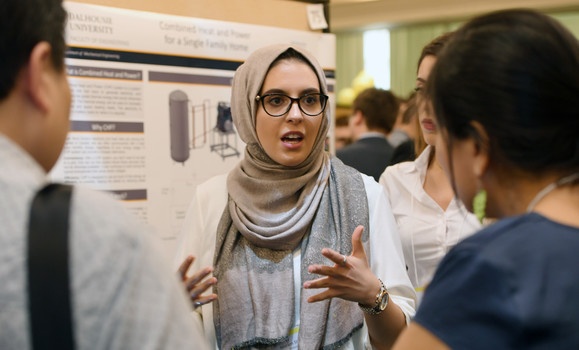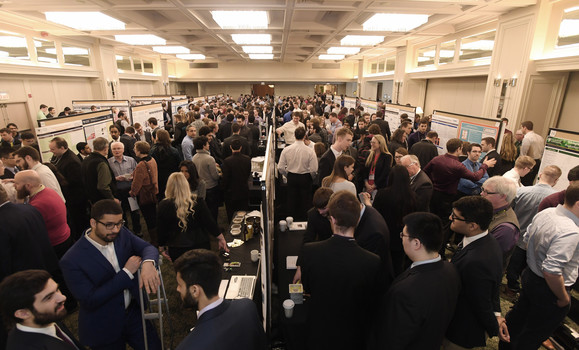News
» Go to news mainHÂþ» Engineering Hosts Capstone Conference

March is National Engineering month in Canada, and engineers from coast to coast are celebrating the importance of careers in engineering.
At HÂþ» University, senior students within the Faculty of Engineering got a chance to show off their future career potential at this yearâs HÂþ» Engineering Capstone Conference (DECC).
The Capstone Conference is the largest event for the senior year classes, incorporating all engineering disciplines within the faculty. The conference gives students the opportunity to showcase how their Capstone Projects integrate course work and engineering design skills to provide innovative solutions to local industry partners.
Originally known as the Design Expo and Poster Competition, the event revolutionized this year with a new name and a new venue location.
âWhen we began planning for this yearâs Design Expo, the newly begun campus renovation meant there was some uncertainty about the availability of Sexton Gym, where we usually hold the event. This led to a brainstorm of how we could change the event, and we realized that by moving offsite we could make the event bigger than before.â says Sandra MacAulay Thompson, member of the Faculty of Engineeringâs âEngineers in Residenceâ, and one of the co-organizers of this yearâs Capstone Conference. âWe decided to add formal student project presentations to the day so that it had the look and feel of a day-long conference.â
All engineering students participate in an eight-month Capstone Project in their final year of studies. At the beginning of the academic year, students are placed into teams and are assigned industry or community based projects. Each team works with their client or mentor to solve specific real-life challenges. Most projects are sponsored by clients from industry.
 âIndustry-sponsored capstone projects give our students a chance to apply their engineering skills to problems that are similar to what they will face as practising engineers,â says Thompson. âThese are open-ended problems with many technical and economic factors to consider. Tackling these types of projects build student confidence and exposes them to the challenges of working in industry.â
This year Dexter Construction Company Limited partnered with a group of industrial engineering students to look at improving their snow removal operations.
The team of students, which consisted of Tate Linzel, Angus Nelson, Matt Shannon and Matt Lyttle, worked together to improve operations in areas such as scheduling, shift change processes, routing and resource utilization.
âOrganizations get to see firsthand the abilities of students, and gain from their innovative thinking and sharp skillsets with minimal cost or risk,â says Michael Parrott, a Project Manager at Dexter Construction. âThe opportunity is equally beneficial for students to contribute and gain experience on a real-world project as they prepare to enter the workforce as junior engineers.â

The Dexter Snow Removal Project was one of approximately 98 projects that were on display at this yearâs Capstone Conference. Like past years, the conference included a poster competition where 48 industry judges assessed each student project based on a variety of criteria including detailed project analysis, student professionalism and overall presentation.
As judges moved from project to project, hundreds of other members from the engineering community squeezed into the Westinâs largest ballroom to learn more about how the next generation of engineers were making an impact on their community.
Student posters ranged from the âDartmouth Cove Master Plan Project,â a project designed to establish streets and sewer infrastructures for the new development of a Halifax Regional Municipality neighbourhood; to a group of students set to power a single family home using a fuel cell and ethanol reforming.
âThe Capstone Conference is an exciting way for students to showcase their work to their fellow students, faculty, industry and the public. By highlighting these projects, we hope to generate interest in the Capstone Program: creating new opportunities for companies to support engineering education, and in turn helping those companies solve some of their tough engineering problems,â says Thompson.
With the launch of the IDEA Project set to transform Dalâs Sexton Campus and Halifaxâs emerging innovation district, the Capstone Program is another great example of how HÂþ»âs Faculty of Engineering is growing strong ties with local industry, and developing partnerships that enhance and strengthen the future of the Halifax community.Â
Interested in getting involved?
Do you have a design problem that needs a solution? If you or your organization would like more information about the Capstone Program, please contact Dr. Clifton Johnston at Clifton.johnston@dal.ca or 902.494.8985
2017 Capstone Conference Poster Winners
The Faculty of Engineering would like to thank all the companies and supporters that provided the projects and exceptional learning experiences for our senior students. Below are the winners of this yearâs Capstone Conference Poster Competition.
DALHOUSIE UNIVERSITY FACULTY OF ENGINEERING AWARD OF EXCELLENCE FOR BEST CAPSTONE POSTER IN CIVIL ENGINEERING:
â6-Storey Wood Buildingâ by Spencer Collier-Jarvis, Zachary Henry, Lindsay Kehoe, Keith Porter
NSERC CHAIR IN DESIGN ENGINEERING AWARD OF EXCELLENCE FOR BEST CAPSTONE POSTER IN ELECTRICAL & COMPUTER ENGINEERING (01):
âImproved Noise Shaping Digital Delta Sigma Modulatorâ by Brett Chiasson, Brendan Lane, Paddy Quinn
NSERC CHAIR IN DESIGN ENGINEERING AWARD OF EXCELLENCE FOR BEST CAPSTONE POSTER IN PROCESS ENGINEERING AND APPLIED SCIENCE:
âDartmouth Fish Passage Between Sullivanâs Pond and the Halifax Harbourâ by Sarah Borden, Sabrina Hiefer, Marie Adrianne Imperial, Yujie Lang
âExpanding Nova Scotiaâs Sustainable Energy Development by Utilizing Decommissioned Quarriesâ by Caroline Forbes, Mitch Gammon, David MacDonald, Nicole Westeinde
SHELL AWARD OF EXCELLENCE FOR BEST CAPSTONE POSTER IN INDUSTRIAL ENGINEERING:
âProcess Automation and Standard Operating Proceduresâ by Ahmed Rayyan, Amer Hussein, Arsalan Ali, Sudarsan Adhikari
SHELL AWARD OF EXCELLENCE FOR BEST CAPSTONE POSTER IN MINERAL RESOURCE ENGINEERING:
âPreliminary Scoping Study of a Au-U-Y Straitiform Paleoplace Quartz-Pebble Conglomerate Deposit, Shubenacadie Area, Nova Scotiaâ by Eric Pushie, Mark Webb, Michael Forsyth and Mitchell Carter
MICHELIN AWARD OF EXCELLENCE FOR BEST CAPSTONE POSTER IN ELECTRICAL AND COMPUTER ENGINEERING (00):
âInertial Based Fall Detection Deviceâ by Frederick Porter, Joel Atkinson, Mason Baker and Miguel Morales
MICHELIN AWARD OF EXCELLENCE FOR BEST CAPSTONE POSTER MECHANICAL AND MATERIALS ENGINEERING:
âAutomated Ring Removal Deviceâ by Patrick Hennessey, Mason Landry, Brad MacKeil, Cal Thompson.
Recent News
- Engineering Young Alumni Reception
- Students scale new heights with Toronto tower pitch
- HÂþ» Students Develop Automation Tool for Irving Shipbuilding
- 2025 Capstone Poster Expo
- HÂþ» Engineering Students Lead the 2025 Canadian Engineering Competition
- âA painless flash of lightâ: Biomedical Engineering student wins 3 Minute Thesis
- Sparking a Passion for Indigenous Engagement in Engineering
- 2025 Engineering Student Experience Showcase
